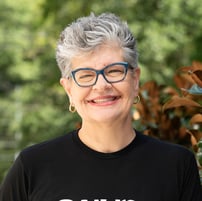Limiting Media, What A Week Away Did - What Would Arlene Say?
Share this
.png?width=1024&name=WWAS%20(16).png)
This past summer went on a 10-day vacation and it was magical. My husband and I biked around Germany. We saw the sites, ate amazing food, enjoyed wonderful time together, and drank fabulous German beer. It was the perfect length of time to get away without being gone for too long. More importantly, it gave me a chance to unplug, which was unbelievably nice.
Why Am I Telling You This?
No, I’m not just bragging. (Well, I kind of am - it was amazing! Be jealous!).
I really want to focus on what having a week away to unplug meant for me - and how you can apply what I learned to your day-to-day.
I struggle to unplug. I know I’m not alone in this. On average, people spend 116 minutes on social media each day. And we use social media sites for so much more than we used to. Gone are the days where our biggest Facebook fear was having to connect with oversharing-Aunt-Sally. Social media is now used to check in with friends and family, shop at various “marketplaces,” network professionally, keep tabs on the Hyndland Station Cat, and read up on breaking news.
In fact, 67% of Americans either somewhat or completely rely on Facebook, twitter, and LinkedIn for news updates. In a way, this is good. The immediate-updates help us to stay informed even when we’re on the go. While I firmly believe that staying up to date on what’s happening in the world is important, I also know it’s easy to get sucked down the rabbit hole.
The Unhealthy Cycle
Many of us fall victim to this same vicious cycle. You scroll on Twitter for 10 minutes until a news article catches your eye. You click, you read, you have an emotional response. If we’re being realistic, the emotional response is probably negative. News outlets rarely report and promote good news - it’s not as popular, because it doesn’t evoke the same visceral reaction in us.
Once you’ve had the unfortunate emotional response to a given news story, you become a bit obsessive. In the interest of staying informed, you read every article available on the topic. You become increasingly upset until you physically have to move on to another, scheduled task in your day.
What’s wrong with this pattern? To state the obvious - being constantly fed negative or distressing news, and having unlimited access to supplemental stories, isn’t good for our mental or emotional health. By constantly reading different accounts of the same breaking news story, we aren’t ensuring that we’re better informed.
We’re driving the same distressing message into our minds repeatedly until we’re too worked up to focus on anything else. Nobody deserves to put themselves through this. Not you, not me. It’s time to take a new approach.
My Experience
While I was away, I did things differently. I had to! I was biking! Across Germany! I trusted close friends and family would let me know if something dramatic and terrible happened, and I had a limited amount of time to check my various social media feeds.
At first, this was a little bit stressful. I had become so accustomed to the endless-news-scroll habit that I didn’t have a clue what I was doing to myself. As the days wore on, however, I felt a sense of freedom.
I had no idea the emotional labor I was forcing myself to do - or how much energy “researching” news articles to “stay informed” was sucking up in my day. I wasn’t reading different, useful information. I was drilling the same negative information into my head. This wasn’t benefiting the causes I cared about, and it certainly wasn’t adding any value to my life or knowledgeability.
When I returned from Germany, I found myself backsliding into old habits. More importantly, though, I recognized that this system was problematic - and I set out to do something about it.
What’s The Solution?
I knew I needed to come up with a different way to access vital news without being bogged down in negativity every hour. My gut instinct was to go back to Germany and unplug forever, endlessly enjoying long bike rides and schnitzel. Since that wasn’t a realistic option, I had to come up with a better solution that fit my daily life.
My first step was to evaluate what the balance between “staying informed” and “obsessing in an unhealthy way” looked like for me. Personally, I love reading the news. So I knew that I couldn’t skip it altogether. Glancing at newsreel highlights once a week also wasn’t going to cut it - there’s way too much going on any given day for me to step away for that long.
Instead, I decided to get selective about which news outlets I was reading with regularity. I also turned off push notifications on my phone and laptop - so that social media and news sites weren’t updating me with an onslaught of breaking news 24/7.
Are You Struggling, Too?
I know that most of us are fairly connected and in-tune with both news and social media sites. If you’re also feeling overwhelmed by constant news-reading cycles and negativity, you’re not alone. This is a fairly common concept these days. In fact, ⅔ of Americans say that news media has a negative impact on both their lives and the U.S. as a whole. Unfortunately, it isn’t easy to break your existing news-consumption cycle. This is especially true for financial planners who may use social media, email, or the world wide web in general to connect with their prospective clients.
I think a key idea is to find a system that works for you and build from there. Here are a few ideas to consider:
- Sign up for a newsletter - and unsubscribe to all of the rest. It’s nice to be able to verify news with different sources, so maybe subscribe to 2. But any more than that? Just say no. If you have a daily news update delivered to your inbox, you’re less likely to miss anything. You’re also less likely to spend hours of time dwelling on one news story or another when you have more valuable uses of your time.
- Schedule your time. I harp on this idea a lot - because it’s important! Schedule news-reading into your daily calendar, and only allow yourself to read through articles during that block of time.
- Get choosy. We all have causes and issues that we’re passionate about - but don’t be afraid to be choosy with where you spend your time online. If you’re dedicated to one political movement, focus your news-reading time on that.
- Take actionable steps. Don’t just read the news. It’s too easy to fall down the rabbit-hole and go into a spiral of dread. Instead, pick what you’re passionate about, and decide what actionable steps you’re going to take to get involved.
- Learn to move forward - not move on. If something in the news is upsetting you, it’s not going to be possible to move on. Work on moving forward instead. Rather than dwelling, decide what you’re going to do about it, or how this information will be incorporated into the rest of your day or week.
- Avoid the comments. Just don’t even read them. It’s not worth your energy.
- DIY a newsfeed. There are so many great tools out there for this - like Feedly. You can choose what topics, news outlets, etc. you want information from. This can help you to limit your negative-news intake and still catch the important updates.
Give Yourself Space
You aren’t ever going to be able to fully detach from the news - it’s not possible in today’s virtual world. However, you can learn to give yourself space. Embrace the emotional reactions you have, allow yourself to be informed. But also give yourself space for creativity, loved ones, and to have “unwind” time.
Taking care of yourself and your family is key to business success. And you can’t do that if you’re constantly stuck in a news-reaction-cycle. If you’re waiting for someone to give you permission to step away from the Twitter feed or turn off your technology to avoid the endless stream of notifications - consider this your permission.
Remember: this isn’t happening to you. You have agency in all of these situations - from deciding how much news you’re going to read to coming up with a plan for taking action when you read something that upsets you. You are in control here - nobody can take that away from you.
As for me, I’m certainly not perfect. I still catch myself reading and re-reading news reports about the same things. But I can say that since I returned from Germany, I’ve learned to take a step back and unplug once in awhile. I’ve also learned to regulate how much news-intake I get in a day.
Let me tell you, it’s been life changing.
 About Arlene Moss, Executive Coach
About Arlene Moss, Executive Coach
Arlene gets a kick out of helping financial advisors get over being overwhelmed and take on their frustrations so their businesses soar. Arlene works to ensure XYPN members are able to help their clients prosper while creating a sustainable business model. Through XYPN Academy and one-on-one coaching, members get the support they need to grow their businesses and overcome the challenges that come their way.
Share this
- Advisor Blog (720)
- Financial Advisors (243)
- Growing an RIA (128)
- Business Development (94)
- Digital Marketing (94)
- Marketing (91)
- Community (82)
- Start an RIA (76)
- Coaching (73)
- Running an RIA (72)
- Compliance (70)
- Client Acquisition (68)
- Technology (67)
- Entrepreneurship (64)
- XYPN LIVE (64)
- Fee-only advisor (49)
- Sales (49)
- Bookkeeping (46)
- Client Engagement (45)
- Practice Management (44)
- XYPN Books (43)
- Scaling an RIA (42)
- Investment Management (41)
- Client Services (31)
- Employee Engagement (31)
- Lifestyle, Family, & Personal Finance (31)
- Financial Education & Resources (30)
- Market Trends (25)
- Journey Makers (23)
- Process (18)
- Niche (13)
- SEO (9)
- Career Change (8)
- Partnership (8)
- Transitioning Your Business (7)
- Sapphire (6)
- Persona (4)
- Transitioning To Fee-Only (4)
- Emerald (3)
- Social Media (3)
- Transitioning Clients (3)
- RIA (2)
- Onboarding (1)
Subscribe by email
You May Also Like
These Related Stories

What to Do During a "Slow" Season: What Would Arlene Say?
Jun 7, 2018
12 min read

The Three G's: A Philosophy For Living Your Best Life - What Would Arlene Say?
Nov 23, 2017
5 min read




